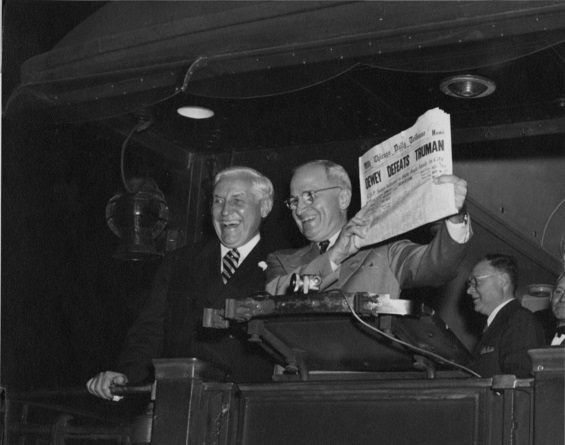How Search Engines Are Predicting Super Tuesday
The projections have been impressively accurate.

Harry Truman holding up the famous edition of the newspaper. (Photo: Harry S. Truman Museum/Public Domain)
If the Chicago Tribune had access to social media and search engine data in 1948, it’s possible that one of the most infamous headlines in newspaper history might never have existed.
“DEWEY DEFEATS TRUMAN,” the headline screamed, referring to opponents Thomas Dewey and Harry Truman in the 1948 presidential election. But, in fact, the opposite had happened. The newspaper based its headline in large part on opinion polls, which showed Dewey with substantial leads.
Polls have gotten more accurate, but all of that also happened, of course, before the internet, which has given forecasters infinitely more data, largely from things like search terms and social media.
Based partially on that data, the Microsoft search engine Bing accurately predicted 419 of 435 House elections, 34 of 35 Senate races, and 33 of 36 gubernatorial elections in the 2014 midterm elections. That year, Bing claimed they got 95 percent of the predictions correct, doing “better head-to-head than renowned forecasters including Nate Silver’s FiveThirtyEight.”
The Bing predictions are based on “polls, prediction markets, and anonymized and aggregated search-engine queries plus social-media posts,” Bing says. Bing has since accurately predicted seven of the eight primaries and caucuses in the 2016 presidential election, missing just Ted Cruz’s win in Iowa.
Their Super Tuesday predictions were released yesterday, and were good news for the presumed frontrunners in the race, Hillary Clinton and Donald Trump.
Clinton and Trump are each projected to win 10 of the 11 states up for grabs on Super Tuesday, according to Bing. The exceptions in each case are two candidates’ home states, with Ted Cruz predicted to take Texas and Bernie Sanders predicted to take Vermont.

Trump in Iowa. (Photo: Matt A.J./CC BY 2.0)
The search engine reports that Sanders had been projected to narrowly win three more states—Massachusetts, Colorado, and Minnesota—but Clinton’s overwhelming victory in South Carolina had tilted those states into her column. The Republican race was less dynamic, with Trump consistently projected to win, Bing said.
Bing’s predictions coincided with the launch of a tool that crunches similar data from Google and Twitter. AP Election Buzz was unveiled on Tuesday, allowing users to monitor search and social media trends for every candidate.
New Jersey Governor Chris Christie’s endorsement of Donald Trump on Thursday was the buzziest thing to happen last week, the data shows, far outpacing searches or tweets about the Nevada Republican caucuses or the Democratic primary in South Carolina.
Trump especially has been known for his social-media prowess; he was the most tweeted about candidate in every state except Vermont last year, according to Google. The AP’s data shows that trend continuing, as Trump has remained the most tweeted-about candidate by a large margin in the past 24 hours. Bernie Sanders is a distant second, followed by Hillary Clinton, Ted Cruz, Marco Rubio, John Kasich, and, at zero percent of the conversation share, Ben Carson.
Google tells a similar story on the relative buzz of each candidate but varies widely on issues. The Patriot Act, Common Core standards, the legality of cannabis, and Glass-Steagall legislation were among the most searched terms according to Google, while on Twitter energy and the environment, foreign affairs, and “racial issues” were dominating the discussion.
Not trending were newspaper front pages. But no matter who wins, if “TRUMP DEFEATS CLINTON” happens next fall, you can bet it might be on Twitter.








Follow us on Twitter to get the latest on the world's hidden wonders.
Like us on Facebook to get the latest on the world's hidden wonders.
Follow us on Twitter Like us on Facebook